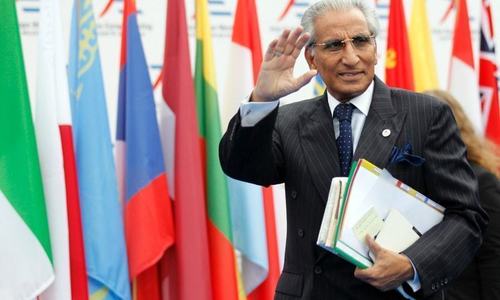WASHINGTON: At the global Nuclear Security Summit held here, Pakistan sought greater acceptance as a responsible nuclear state.
“We believe that since Pakistan has strong credentials on nuclear safety, security and non-proliferation, it qualifies for full integration in the multilateral export control regimes,” a statement presented at the summit said.
Pakistan assured the international community that it was strongly committed to the objective and had been proactively engaged with efforts to promote nuclear safety and security.
“Pakistan has ensured that nuclear and radioactive materials and all related facilities are secured in all places,” said the ‘national statement’ read at the summit.
Tariq Fatemi submits two statements at summit
Special Assistant on Foreign Affairs Syed Tariq Fatemi, who represented the country at the summit after the prime minister opted out because of internal pressures, also read another statement, called ‘intervention’, spelling out Pakistan’s positions on the issues raised during the conference.
Both statements assured world leaders that Pakistan was a responsible nuclear power and was party to several international instruments relevant to nuclear safety and security.
“Within the framework of these instruments and the IAEA activities and programmes, Pakistan is committed to international cooperation consistent with our national priorities,” one of the statements said.
Pakistan informed the participants that it took the responsibilities related to nuclear safety and security very seriously and its nuclear security regime was effective, dynamic and responsive to the entire range of threats.
The elements of nuclear security in Pakistan include a robust command and control system under the National Command Authority, a rigorous regulatory regime, comprehensive export controls and cooperation with the International Atomic Energy Agency and other countries.
The country reiterated that its export controls were consistent with those being implemented by the Nuclear Suppliers Group, Missile Technology Control Regime and the Australia Group. Pakistan’s Centre of Excellence on Nuclear Security continues to grow into a regional and international hub.
It explained how it had been running a safe, secure and safeguarded civil nuclear programme for more than 40 years.
The official statement noted that even the summit recognised nuclear security as a national responsibility and as a responsible nuclear state, Pakistan accorded the highest priority to the security of its facilities.
“Pakistan’s nuclear security paradigm, evolved over the years, is effective and responsive against the entire range of possible threats. Nuclear security regime in Pakistan is dynamic and regularly reviewed and updated.”
Pakistan explained that the regime was based on the national legislative, regulatory and administrative framework.
“Pakistan follows the principle of multi-layered defence to prevent and effectively respond to the entire spectrum of threats and has established a specially trained, highly skilled and well-equipped force that is designed for nuclear security.”
The statement explained that Pakistan’s regulatory regime encompassed all matters related to nuclear safety and security, including physical protection of materials and facilities, material control and accounting, transport security, prevention of illicit trafficking and border controls.
It includes plans to deal with possible radiological emergencies through an elaborate Nuclear Emergency Management System.
“As a country with advanced nuclear fuel cycle capability, Pakistan is in a position to provide nuclear fuel cycle services under IAEA safeguards, and to participate in any non-discriminatory nuclear fuel cycle assurance mechanisms,” Mr Fatemi said.
Published in Dawn, April 3rd, 2016
















































